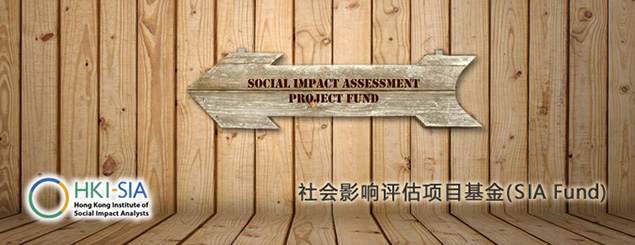
Partner Organization: Hong Kong Institute of Social Impact Analysts
Project Duration: Dec 2014 – Dec 2017
Project Status: Completed
The Social Impact Assessment Fund (SIA Fund) – the first of its kind in Hong Kong – was initiated by the Xu Family Charitable Foundation, the Beijing Yifang Foundation and the RS Group which partnered the Hong Kong Institute of Social Impact Analysts. The fund hopes to encourage non-profit organizations in Hong Kong, mainland China and East Asia to acquire more social impact tools in order to continuously improve project design, implementation and evaluation standards, ultimately raising the capabilities of research talents in social enterprises. In 2015, the fund launched several studies, including a study on how to value happiness and comparing the SROI and B Impact Assessment frameworks.

Partner Organization: China Agricultural University
Project Duration: Dec 2014 - Dec 2015
Project Status: Completed
The purpose of this project was to improve NGOCN’s weekly charity publication in order to promote the public welfare sector to mainstream society. Together with other channels of communication, this electronic weekly publication was created so that the public would have easy access to any updates and developments in the sector. By doing so, raise the professional standards of the Chinese public welfare sector and at the same time help in educating the public. The editorial team hired professionals to optimize the layout, design and WeChat content to improve the reader’s reading experience. The changes initiated were based on a reader survey conducted in the second half of 2014.
The Beijing Yifang Foundation was the sole sponsor of the project.
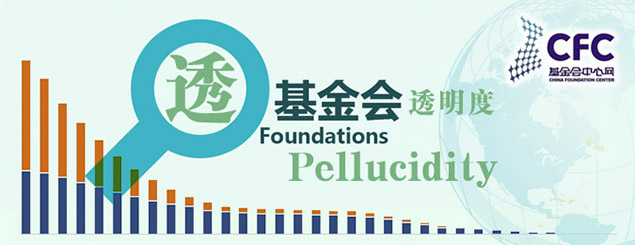
Partner Organization: China Foundation Centre
Project Duration: Oct 2014-Jan 2015
Project Status: Completed
The flourishing public welfare sector in China inevitably faced many challenges for example, newly established foundations often struggled with the set-up process with little guidance or knowledge, and almost no reference when preparing annual reports. This situation urged many organizations to willingly share their experiences however, there was no standardized way of doing so. The China Foundation Centre was first to develop the China Foundation Transparency Index (FTI), used to assess the transparency of foundations. Unfortunately, many foundations did not understand the use and implementation of the index. This project was set up to tackle this issue and hoped to do so over the span of three months. The project created an FTI operations manual to help newly established foundations and foundations striving to improve their transparency. The project also developed an application and corresponding FTI operations guidebook to facilitate convenient and fast learning speeds and adoption rates.
The Beijing Yifang Foundation is the sole sponsor of the China Foundation Transparency Index operations manual research project.
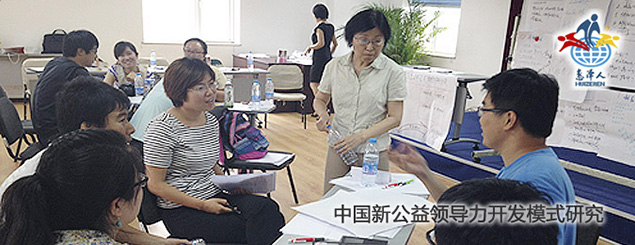
Partner Organization: Beijing Huizeren Pro Bono Academy
Project Duration: Jul 2014 - May 2015
Project Status: Completed
In this project, the foundation partnered with the Beijing Huizeren Pro Bono Academy and YouChange China Social Entrepreneur Foundation to organize China’s New Public Welfare Leadership Training Programme and China’s New Public Welfare Leadership Society. The two initiatives served as research trials to identify and groom future public welfare leaders. The aim was to come up with a method that can be widely implemented so as to raise the quality of leadership for the overall benefit of the industry. The programmes were designed on the basis of theoretical and practical research and were continuously improved during implementation. The project directly benefitted one thousand non-governmental organization (NGO) leaders and indirectly helps NGOs to grow from within, enhance project implementation, professional capabilities and management standards.
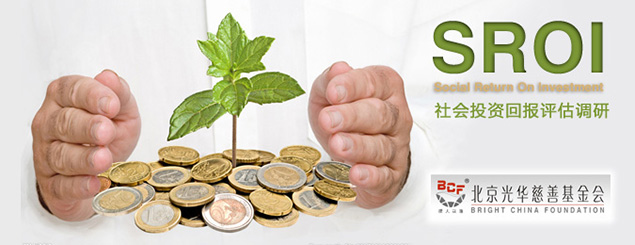
Partner Organization: Beijing Bright China Foundation
Project Duration: May 2014-Dec 2014
Project Status: Completed
Social Return on Investment (SROI) is a methodology for measuring social value and is a comprehensive measure of the social, environmental and economic value of public welfare projects and project implementers. The Beijing Bright China Foundation used the SROI methodology on their entrepreneurship education project in Jiangsu as a case study. The purpose was to study SROI in a real-life environment to gain a deeper understanding and evaluate its suitability in China. At the same time develop an SROI operational toolkit for the benefit of non-profit organizations.
• Bridge Plan – Financial Management Capacity Building Project
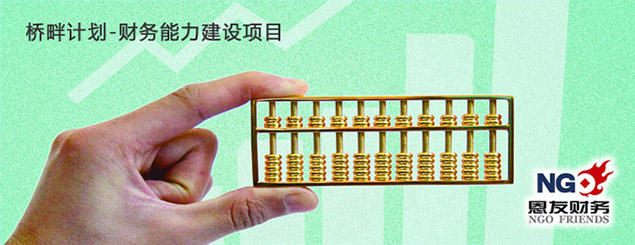
Partner Organization: NGO Friends
Project Duration: May 2014 - Jul 2015
Project Status: Completed
A large number of public welfare organizations were established in recent years. The largest number being the micro start-up public welfare organizations with annual income of less than RMB 30,000. These organizations lacked skilled employees with the relevant finance knowledge in order to meet minimum financial management standards. In order to help these organizations, NGO Friends developed a financial management manual which included basic standards, methods and tools relevant for micro start-up public welfare organizations. The manual was implemented in five organizations in the Bridge Plan programme (Western Sunshine Foundation) as a trial, to ascertain if it was sufficient for equipping a small organization with no prior financial management experience with the relevant knowledge to successfully set up a basic financial management system. Feedback from these five organizations and thirty other Bridge Plan partners were used to improve the manual so that it could be promoted and adopted on a larger scale, with the goal of raising the financial management capabilities of the public welfare organizations.
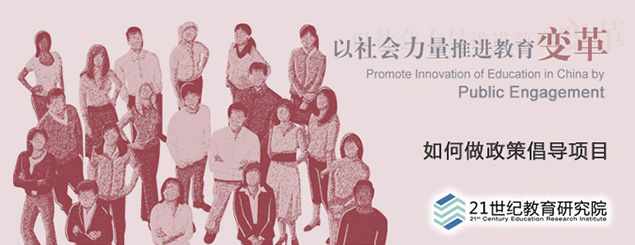
Partner Organization: 21st Century Education Research Institute
Project Duration: May 2014 - May 2015
Project Status: Completed
The absence of independent non-government institutions in the field of policy advocacy led to the formulation and implementation of major domestic policies that lack third-party evaluation practices. This situation resulted in a large number of errors when implementing national policies which was not only costly but negatively affected the country’s development and people's livelihood. At the same time, the lack of experience of private institutions make it difficult to form a dialogue with the government when conducting policy research and advocacy. Based on its years of policy research and advocacy experience and its influence in the field of private think tanks, the 21st Century Education Research Institute engaged domestic and foreign experts in policy research and advocacy to summarize, refine, and study how civil institutions can effectively carry out policy advocacy. By doing so, allow more institutions to carry out policy research and advocacy more effectively, actively contribute ideas and suggestions toward the promotion of China's transformation. The project lasted for one year.
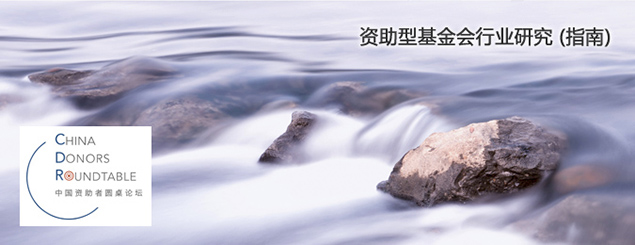
Partner Organization: China Donors Roundtable
Project Duration: 2014 - 2017
Project Status: Completed
There has been increased discussions about the public welfare value chain in recent years, in particular, foundations funded through fund-raising are increasingly being accepted. At the same time, the relevant government departments have been encouraging foundations to organize more fund-raising projects. However, many foundations continue to struggle in this aspect. The Social Resources Institute conducted an eight-month long survey on the existing fund-raising landscape in China and with the results of the survey, created an initial fund-raising framework. Some of the key outcomes of the survey is the survey report - a handbook on effective fund-raising methods in China, a plan to promote fund-raising in the medium term and immediate term goals. This study hopes to improve the fund-raising landscape and capabilities in order to raise the social value of foundations.
The Beijing Yifang Foundation, together with the Narada Foundation, the Macau Tong Chai Charity Association and the Zhenro Foundation jointly funded the study.

